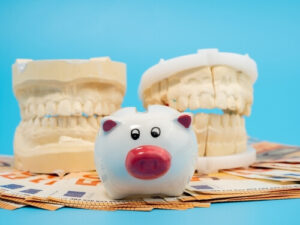Dental implants offer numerous advantages: the radiant smile, the confidence they instil, and the functionality they restore. But the looming question for many remains: How much is a tooth implant? It’s a query that doesn’t just touch upon monetary concerns but also the value proposition of the procedure.
Join us as we delve into the intricacies, the variables, and the considerations that define this investment in your dental future.
Importance of replacing missing or damaged teeth
In the grand tapestry of oral health, each tooth plays a pivotal role, contributing to aesthetics and function. Consequently, missing or damaged teeth aren’t just a cosmetic concern but can lead to a domino effect of potential oral issues. Let’s delve into the critical importance of addressing these dental gaps and the solutions at hand:
1. Aesthetics and Confidence:
First and foremost, a missing or damaged tooth’s immediate impact is often on one’s self-esteem. A confident smile, free from visible gaps or damage, plays a significant role in personal interactions and self-perception.
2. Functional Impairments:
Missing teeth can drastically impact everyday activities like chewing and speaking. Over time, this can lead to dietary changes and even speech impediments, undermining the quality of life.
3. Jaw Bone Health:
Each tooth plays a vital role in maintaining the integrity of the jaw bone. When a tooth is lost, the jaw bone in that area may begin to atrophy or recede, weakening the overall structure and compromising the health of adjacent teeth.
4. Neighbouring Teeth:
A missing tooth can cause neighbouring teeth to shift or rotate, leading to a misaligned bite. This can affect aesthetics and result in uneven wear or jaw issues.
5. Dental Implant as a Solution:
Enter the realm of dental implant treatment, a cutting-edge solution to address the woes of missing or damaged teeth. A dental implant procedure involves inserting a titanium post into the jaw bone, which acts as an artificial root, supporting a prosthetic tooth.
Advantages of choosing dental implant surgery for missing teeth
Navigating the realm of dental treatments, especially when faced with the challenge of replacing missing teeth, can be both intimidating and intricate. However, dental implant surgery, a cornerstone of modern implant dentistry, has revolutionised the landscape of tooth replacement options. Here’s a deep dive into the myriad advantages of this groundbreaking dental procedure:
1. Lifelike and Functional: Unlike other tooth replacement options, dental implants mimic a tooth’s natural structure. The titanium implant serves as an almost artificial tooth root, ensuring that the replacement tooth is aesthetically pleasing and fully functional.
2. Preservation of Surrounding Teeth: Opting for a dental implant means no need to alter adjacent teeth, which might be the case for more implants with solutions like bridges. The implant procedure contributes significantly to overall oral health by preserving the integrity of surrounding teeth.
3. Durability and Longevity: Dental implants boast an impressive lifespan. Good oral hygiene and regular dental care can last for decades, making them a cost-effective solution in the long run.
4. Jawbone Health: One of the standout benefits of dental implants is their role in preventing bone and existing tooth loss. When faced with tooth loss, the jawbone can begin to deteriorate. However, the surgical placement of an implant stimulates the bone, preventing such degradation and even promoting growth.
5. Versatility: Whether it’s a single missing tooth, several missing teeth, or a full set, dental implants offer versatile solutions. There’s a tailored solution for every scenario, from a single-tooth implant to implant-supported dentures for one or more teeth or even an implant-supported bridge.
6. Cost Considerations: While the initial single tooth, dental implant cost, or implant-supported bridge cost might seem higher than other alternatives, it’s crucial to consider longevity and reduce future dental treatments. According to the national dental fee survey, while the upfront investment might be considerable, the long-term value derived from dental implants is unparalleled.
7. Enhanced Comfort and Natural Feel: Forget the discomfort of ill-fitting dentures or the hassle of fake teeth. Dental implants provide a comfortable, natural feel, seamlessly integrating with existing teeth and ensuring unhindered speech and eating.
8. Bone Augmentation and Advanced Procedures: For those with insufficient bone, advanced procedures like bone grafting or sinus lift can prepare the site for the implant. Though daunting, these processes have become routine and highly successful in experienced dentist’s hands.
9. Dental Insurance and Financial Aspects: With the rising popularity of dental implant procedures, many private health insurance plans are beginning to offer dental coverage for these treatments, making them more financially accessible for patients.
How much is a tooth implant

- Consultation Fees: Before initiating the procedure, most clinics charge for a detailed dental examination, X-rays, and sometimes even a CT scan to gain a comprehensive understanding of the patient’s oral landscape.
- Surgical Costs: The actual procedure of placing the titanium implant into the jawbone constitutes a significant chunk of the overall expense.
- The implant Itself: The material and quality of the dental implant, typically made of titanium, also influence the price.
- Abutment and Crown: Post the integration of the implant with the bone, an abutment (a connecting piece) and the crown (the visible tooth) are placed. These components have their associated costs, influenced by material choice and craftsmanship.
- Bone Grafting or Sinus Lift: In situations where the patient lacks the necessary bone density, supplementary procedures like bone grafting or sinus lifts may be needed, adding to the total expenditure.
- Post-surgical Care: Follow-up visits, potential medications, and aftercare kits may also factor into the total dental implant treatment costs.
- Geographical Variations: Often overlooked, the location of the dental clinic and local market conditions can also sway the overall pricing.
- Clinic’s Expertise: Established clinics or those with renowned dental surgeons might charge a premium for their expertise and advanced technologies employed.
Cost variations: single dental implant vs. full mouth dental implants cost
The realm of dental implant procedures offers a range of solutions tailored to individual needs, each coming at its own cost. Among the choices available, the most commonly deliberated upon are single and full-mouth dental implants. Here’s a concise breakdown of the cost variations between these two options:
- Single Implant Costs: Opting for a single dental implant primarily caters to replacing a singular missing or damaged tooth. This entails the cost of the implant, the abutment, the crown, and the surgical procedure for insertion.
- Full Mouth Implants Costs: When considering full-mouth dental implants, one looks at a comprehensive solution for multiple missing teeth. This can involve individual implants for each tooth or implant-supported dentures or bridges. The costs here accumulate due to the number of implants required, the complexity of the procedure, and the type of prosthesis chosen.
- Volume Discounts: Often, when multiple implants are placed in a single session, dental clinics offer a volume discount, making the per-tooth cost lower than that of a singular implant.
- Additional Procedures: Full mouth restorations may sometimes necessitate supplementary procedures, such as bone grafting or sinus lifts, which can elevate the total expenditure.
- Longevity and Maintenance: While the upfront cost of full mouth implants may be substantial, the long-term benefits and reduced maintenance expenses can make it a more cost-effective solution in the grand oral health scheme.
In summary, while the single dental implant and full mouth dental implants cater to different serious dental care needs, understanding the cost components of each helps in making an informed decision. It’s essential to consider the immediate financial outlay and the long-term value, durability, and impact on one’s quality of life.
How to budget for dental implant costs
As dental implants emerge as the gold standard in tooth replacement, especially in scenarios where dental bridges or immediate tooth replacement post-tooth extraction isn’t viable, understanding how to budget for such an investment becomes essential. Here’s a guide to help you navigate this financial journey:
1. Comprehensive Cost Analysis: Begin by understanding the entire dental implant process. Each stage has its associated costs, from the initial consultation of potential treatments for gum disease to the final placement of teeth implants. Getting a detailed breakdown can provide clarity.
2. Comparing Options: While a single dental implant might be the solution for one missing tooth, mouth dental implants might be the choice for extensive tooth decay or loss. Research and compare the costs of different tooth replacement methods, weighing their pros and cons.
3. Pre-emptive Treatments: Certain conditions, like the need for a bone grafting procedure, can add to the initial expenditure. By anticipating these requirements, you can be better prepared financially.
4. Dental Health Insurance: Explore the depths of your dental health insurance benefits. While not all dental insurance policies cover dental procedures like implants, some offer partial coverage or discounts, significantly easing the financial burden.
5. Payment Plans and Financing: Many dental clinics understand the significant investment of choosing implants over natural teeth. Hence, they often offer flexible payment plans or financing options, enabling patients to spread out the cost of dental implants over time.
6. Prioritise and Phase Out: Consider prioritising if you’re looking at multiple teeth implants. Addressing the most urgent dental treatment needs and spacing out subsequent implants can distribute the financial strain.
7. Long-term Value Proposition: Dental implants, with their durability and near-natural feel, often outlive other dental procedures. When budgeting, factor in the longevity and reduced long-term maintenance of dental implant costs compared to other methods.
The difference between natural teeth and teeth implants

- Origin: The most obvious difference lies in their origin. Natural teeth grow organically and are rooted in the jawbone through a periodontal ligament. Teeth implants, on the other hand, are artificial, typically constructed from titanium, and surgically placed into the jawbone.
- Durability: While natural teeth are strong, they can be susceptible to decay, gum disease, and wear over time. Teeth implants made of metal and resistant materials do not decay. With proper care, they can often last a lifetime.
- Maintenance: Natural teeth require regular brushing, flossing, and check-ups to prevent cavities and gum issues. Teeth implants also require diligent care but are not vulnerable to cavities. However, the health of the surrounding tissues remains crucial.
- Aesthetics: Modern teeth implants are designed to mimic natural teeth’ appearance closely. However, since they do not discolour over time like natural teeth might, they can retain their aesthetic appeal for longer.
- Sensation: Natural teeth living structures can sense temperature, pressure, and other stimuli. Teeth implants, being artificial, do not have this same sensory feedback, although the surrounding tissues may still provide some sensation.
- Bone Health: One of the advantages of teeth implants is their role in maintaining bone health. Natural teeth, when lost, can lead to bone loss in the jaw. Implants can help stimulate and maintain bone, preventing this deterioration.
Conclusion
When weighing the benefits of dental restoration against the costs, understanding the full spectrum of factors influencing how much does mouth dental implant cost becomes vital. From materials used to the dental surgeon’s expertise, numerous variables play a role in the final figure. But beyond the price tag, the promise of renewed confidence, functionality, and the joy of a dazzling smile truly encapsulates this investment’s value. Ensure you’re making an informed decision, and always consult with professionals when considering such pivotal dental procedures.
For those seeking clarity on the tooth implant price, taking action is the first step towards achieving a rejuvenated smile. At Digital Dental Surgery Sydney, we’re here to guide you through every facet of the process, ensuring you make informed decisions tailored to your individual needs. Don’t let uncertainties hold you back; your path to dental transformation is just a call away. Contact us at (02) 8294 5812, and let’s embark on this journey together.
References
Dental implant surgery
https://www.mayoclinic.org/tests-procedures/dental-implant-surgery/about/pac-20384622
Dental Implants: What You Should Know
https://www.fda.gov/medical-devices/dental-devices/dental-implants-what-you-should-know
Immediate single-tooth implant placement with simultaneous bone augmentation versus delayed implant placement after alveolar ridge preservation in bony defect sites in the esthetic region: A 5-year randomized controlled trial
https://pubmed.ncbi.nlm.nih.gov/33724473/
Dental implant procedure
https://www.healthdirect.gov.au/dental-implant
Dental Implants
https://www.webmd.com/oral-health/dental-implants






